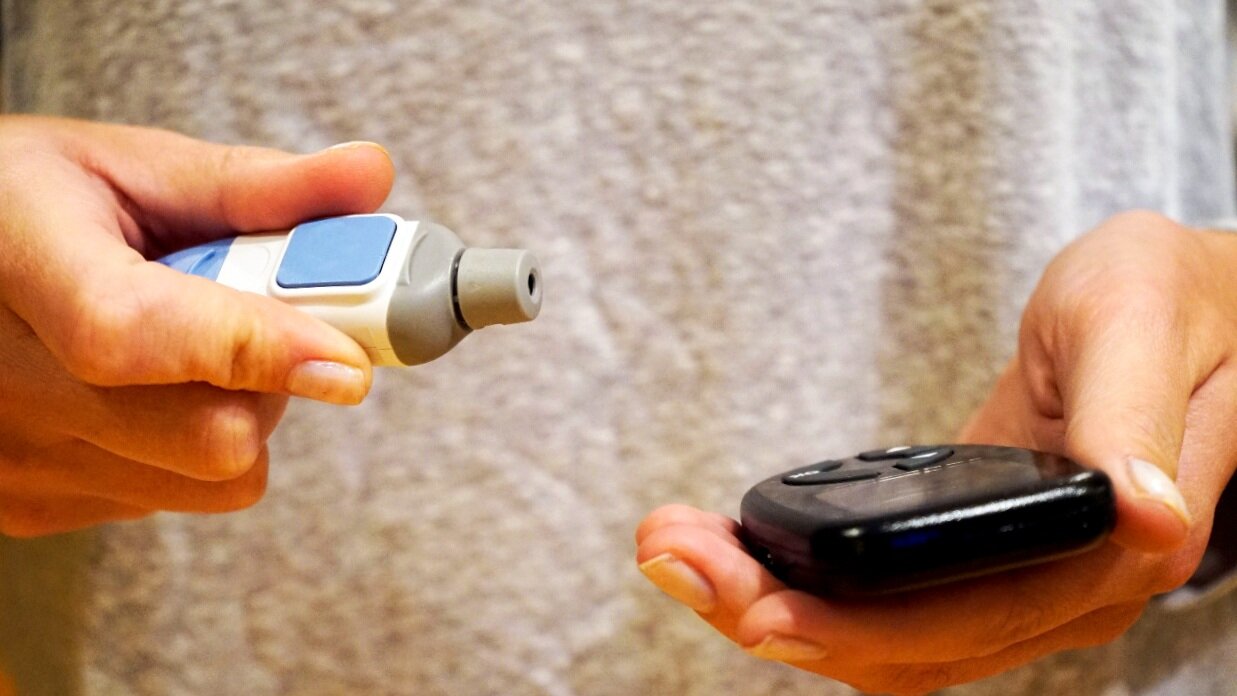
FAQs
What is low blood sugar? How does low blood sugar make me feel?
Low blood sugar levels are called hypoglycemia. This happens when your sugar level is below 70 mg/dL. This can make you feel weak, sweaty or dizzy.
- Causes of low blood sugar: not enough food, too much insulin or diabetes medications or extra activity
- How it starts: very quickly, may lead to passing out
- How it feels: shaking, fast heartbeat, sweating, dizziness, feeling anxious or irritable, hunger, vision changes, weakness, fatigue, headache
- What to do: drink half a glass of juice or a regular soft drink or 1 glass of milk; or eat some soft candies
What is high blood sugar? How does high blood sugar make me feel?
High blood sugar levels are called hyperglycemia. This happens when your sugar level is above 200 mg/dL. Hyperglycemia can make you use the bathroom often, feel very thirsty or sick.
- What causes it: too much food, too little insulin or diabetes medications or stress How it starts: often starts slowly.
- May lead to a medical emergency if not treated
- How it feels: feeling very thirsty, need to use the bathroom often, dry skin, hungry, blurry vision, sleepy, wounds that do not get better
- What to do: check your blood glucose and call your doctor
What is the hemoglobin A1c?
The hemoglobin A1c is a blood test which gives the three month average of blood sugar. This is one of the ways that blood sugar control is monitored. Ask your healthcare provider what your goal hemoglobin A1c should be.
How do I keep track of my blood sugars?
Bring your glucose meter to every doctor's appointment. Most glucose meters can be downloaded to a computer so you can follow your blood sugar. You will need the computer program and the right tools from the company that makes your meter to do this at home.
Where can I write down my blood sugars and/or medications?
Click here to view and print a log to track your blood sugars and medication.
What should I do if I take the wrong insulin or the wrong dose?
Do not panic! Call your doctor or 911 right away. If you did not take enough insulin, your sugar levels may be high. You may need more insulin. If you took too much insulin, you may need to eat more and check your sugar more often.
What types of insulin are there? How do I know which one to use?
There are many types of insulin. Each type of insulin will work in your body for a different amount of time. Some insulin types work very quickly and are taken right before you eat. Other types of insulin last for a whole day. These do not have to be taken with food.
What if I have a problem with my meter, insulin or diabetes medications?
Talk to your pharmacist or your doctor if you have questions about medications. If your meter is not working, you can call the number on the back of your meter for help.
What do I do with used lancets and needles (sharps)?
Sharps containers should be made of plastic so that a needle cannot go through and hurt someone. The lid should fit tightly and the needle should not be able to go through it. The sides and bottom of the container should not leak. You can find these through your doctor, pharmacy, or online. How and where you throw away your sharps depends on where you live. For more information on where to throw away sharps, call your local health department or visit www.safeneedledisposal.org and www.fda.gov/safesharpsdisposal.
What happens to my blood sugar when I am sick?
Being sick can make you blood sugar either high or low. Because of this it is important to monitor your blood sugar regularly when you are sick. Click here for more information about sick days including when you should call your doctor.
Why is it important to keep blood sugar under control? What are the long term effects of diabetes?
Diabetes can cause damage to the eyes (retinopathy), nerves (neuropathy), kidneys (nephropathy), and blood vessels leading to an increased risk of heart disease and stroke. Diabetes can also increase your risk for foot infections, gangrene and amputations. Keeping blood sugars under control can help to decrease these risks.
Other than blood sugar control, what else can I do to decrease the risk of complications?
Regular visits to the eye doctor and monitoring your feet for any cuts or wounds is important. You should also see your doctor regularly for blood pressure checks and may require medication for high blood pressure (hypertension) or high cholesterol. Stopping smoking can also greatly reduce the risk of heart disease and strokes.
Where can I find more information on nutrition?
Click here for more information on the American Diabetes Association Nutrition Page.
What can I learn from a certified diabetes educator?
Certified diabetes educators (CDE) are a very important part of the treatment of diabetes and can provide you with both general information about diabetes as well as recommendations specific for you. They can teach you about diabetes medications, checking blood sugar and injecting insulin. They can also provide information on safe exercise and activity.
Where can I learn how to check blood sugar or inject insulin?
Your doctor, a diabetes educator or a nurse will show you how to check your blood sugar and how to inject insulin. This site can also help. Our goal is to give you and your loved ones information about diabetes and diabetes tools. Ask you doctor about diabetes education. You can find a Certified Diabetes Educator (CDE) near you through your doctor's office. Here are some additional resources to help you find a CDE:
